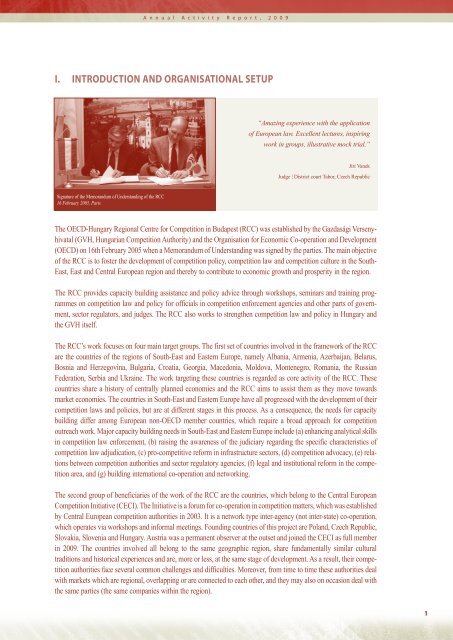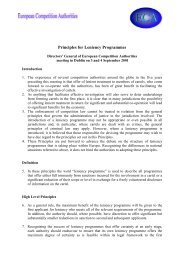Untitled - GVH
Untitled - GVH
Untitled - GVH
You also want an ePaper? Increase the reach of your titles
YUMPU automatically turns print PDFs into web optimized ePapers that Google loves.
A n n u a l A c t i v i t y R e p o r t , 2 0 0 9<br />
I. IntroductIon and organIsatIonal setup<br />
Signature of the Memorandum of Understanding of the RCC<br />
16 February 2005, Paris<br />
“Amazing experience with the application<br />
of European law. Excellent lectures, inspiring<br />
work in groups, illustrative mock trial.”<br />
Jiri Vanek<br />
Judge | District court Tabor, Czech Republic<br />
The OECD-Hungary Regional Centre for Competition in Budapest (RCC) was established by the Gazdasági Versenyhivatal<br />
(<strong>GVH</strong>, Hungarian Competition Authority) and the Organisation for Economic Co-operation and Develop ment<br />
(OECD) on 16th February 2005 when a Memorandum of Understanding was signed by the parties. The main objective<br />
of the RCC is to foster the development of competition policy, competition law and competition culture in the South-<br />
East, East and Central European region and thereby to contribute to economic growth and prosperity in the region.<br />
The RCC provides capacity building assistance and policy advice through workshops, seminars and training programmes<br />
on competition law and policy for officials in competition enforcement agencies and other parts of government,<br />
sector regulators, and judges. The RCC also works to strengthen competition law and policy in Hungary and<br />
the <strong>GVH</strong> itself.<br />
The RCC’s work focuses on four main target groups. The first set of countries involved in the framework of the RCC<br />
are the countries of the regions of South-East and Eastern Europe, namely Albania, Armenia, Azerbaijan, Belarus,<br />
Bosnia and Herzegovina, Bulgaria, Croatia, Georgia, Macedonia, Moldova, Montenegro, Romania, the Russian<br />
Federation, Serbia and Ukraine. The work targeting these countries is regarded as core activity of the RCC. These<br />
countries share a history of centrally planned economies and the RCC aims to assist them as they move towards<br />
market economies. The countries in South-East and Eastern Europe have all progressed with the development of their<br />
competition laws and policies, but are at different stages in this process. As a conse quence, the needs for capacity<br />
building differ among European non-OECD member countries, which require a broad approach for competition<br />
outreach work. Major capacity building needs in South-East and Eastern Europe include (a) enhancing analytical skills<br />
in competition law enforcement, (b) raising the awareness of the judiciary regarding the specific characteristics of<br />
competition law adjudication, (c) pro-competitive reform in infrastructure sectors, (d) com pe tition advocacy, (e) relations<br />
between competition authorities and sector regulatory agencies, (f) legal and institu tional reform in the competition<br />
area, and (g) building international co-operation and networking.<br />
The second group of beneficiaries of the work of the RCC are the countries, which belong to the Central European<br />
Com pe tition Initiative (CECI). The Initiative is a forum for co-operation in competition matters, which was established<br />
by Central European competition authorities in 2003. It is a network type inter-agency (not inter-state) co-operation,<br />
which operates via workshops and informal meetings. Founding countries of this project are Poland, Czech Republic,<br />
Slovakia, Slovenia and Hungary. Austria was a permanent observer at the outset and joined the CECI as full member<br />
in 2009. The countries involved all belong to the same geographic region, share fundamentally similar cultural<br />
traditions and historical experiences and are, more or less, at the same stage of development. As a result, their competition<br />
authorities face several common challenges and difficulties. Moreover, from time to time these authorities deal<br />
with markets which are regional, overlapping or are connected to each other, and they may also on occasion deal with<br />
the same parties (the same companies within the region).<br />
1



